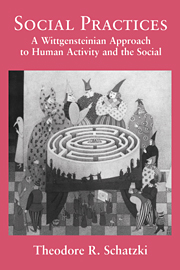Book contents
Preface and Acknowledgments
Published online by Cambridge University Press: 17 September 2009
Summary
This book was a long time coming. A necessary detour in a previous manuscript through an individualizing appropriation of Heidegger's conception of Dasein and world delayed return to the encompassing context of practices announced in Wittgenstein. The current work attempts to retain insights of the detour within a practice framework.
The book is organized as follows. Chapter 1 describes my aim of developing a conception of practice that positions social practices as the central phenomenon in social life. It also locates this project in the swirling currents of contemporary social thought. The venture then commences in Chapter 2 with an account of mind/action developed as a systematizing interpretation of Wittgenstein's late remarks on mentality. Following this, in Chapter 3, an analysis of the social constitution of mind/action concludes by insinuating practices as the social context of this “process.” In Chapter 4, I present my account of social practices, focusing on the configuration of activity and articulation of intelligibility that occur within them. Chapter 5 argues for the superiority of this account over those of Bourdieu, Giddens, and Lyotard. The book then concludes in Chapter 6, where social practices are revealed to be the central context of human coexistence and initial steps are taken toward conceiving the social field as a nexus of practices.
The manuscript was written while on fellowship in Norway and Germany.
- Type
- Chapter
- Information
- Social PracticesA Wittgensteinian Approach to Human Activity and the Social, pp. xi - xiiPublisher: Cambridge University PressPrint publication year: 1996



